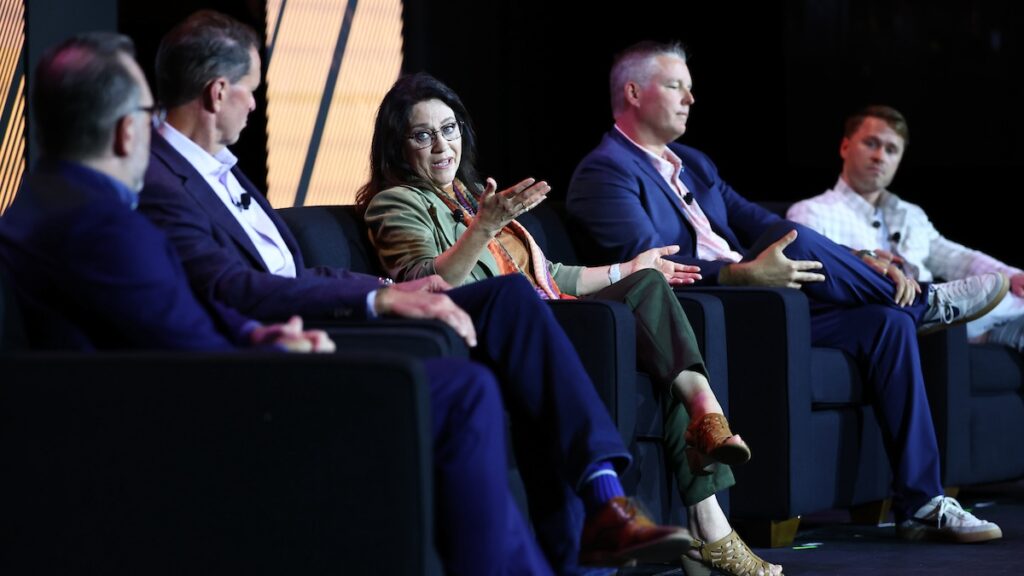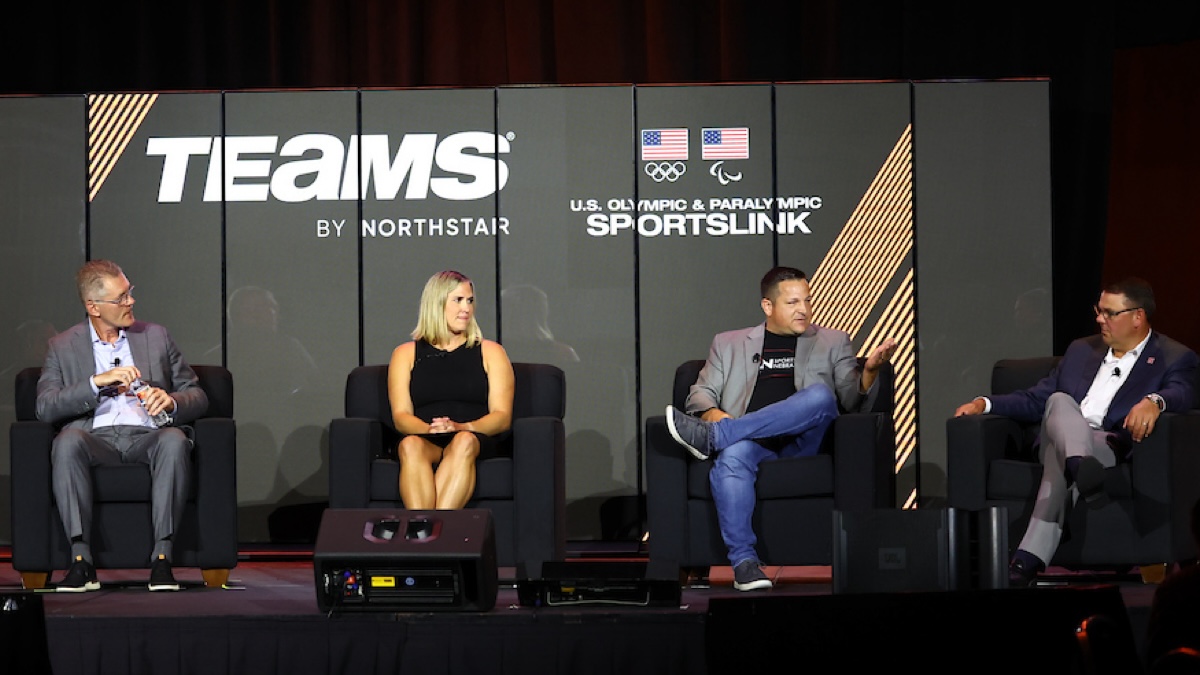TEAMS ’24; Best of Day 1
Educational sessions feature event funding methods and unique venues of play
Posted On: September 24, 2024 By :
Roughly half of states in the U.S. have some form of major event fund that destinations can use to help attract major events to their cities. These programs look different in each state, and some states are having more success than others.
This session is sponsored by Panama City Beach Sports
The Speakers
Anthony Brenneman, Executive Director, Orange County Sports Commission: Brenneman leads the start-up 501c3 nonprofit with the mission to enhance the economic, social and cultural vitality of its communities through sports.
Janis Burke, CEO, Harris County – Houston Sports Authority: Under Burke’s leadership and during her tenure, Houston has been awarded major sporting events including the NCAA Men’s Final Four, various U.S. Olympic Trials, numerous national and world championships and the AAU Junior Olympics.
Mark Poole, Director of Commerce Finance Center, North Carolina Department of Commerce: Poole manages a variety of the department’s grant programs and discretionary incentives, including the Major Events, Games and Attractions Grant Fund and other programs that support economic development activities within business, industry and sports across the state.
What They Said
Anthony Brenneman: “California doesn’t have a state event fund and is late to the game. There are 23 states that have a state event fund, and next year it will be 25. We thought we didn’t have to incentivize bringing in sporting events, and it’s gotten so competitive now with World Cup, NCAA, Super Bowl, all the way down to smaller events. We’ve told our state law makers that we’ve lost out on events and need to have a fund. Our push is for the smaller and medium markets — everybody has a thirst to host sporting events, but they need the funding and support. The fund would allow them to be competitive as well.”
Janis Burke: “I don’t know if we would’ve bid for and hosted many major championships if it wasn’t for the Texas Major Events Fund. We are a major international city, which showed when we sold 30,000 tickets for a table tennis event — and that awakened our Chinese American citizens and the table tennis fanbase in the region. But without the funding that’s an event that would’ve never happened… The main concern is that you’re being reimbursed, and we have to go out and secure the money and don’t get paid back for 12 months. So we value our corporate sponsorships and we rely on them.”
Joe Piotrowski: “The Florida Fund is financed by the license plate program, which was developed out of need to host the Super Bowl 20 years ago. All of the professional teams in Florida allow us to utilize their likeness for free, and we give back to the philanthropy side of the pro teams. We rely on our sports commissions because they’re the ones on the ground making sports tourism happen in the state of Florida. They are our advocates with the sports teams in the communities. We support 200 events annually and only 10-15 are in major facilities, they are spread out to youth facilities around the state.”
Mark Poole: “The Major Events, Games and Attractions Grant Fund in North Carolina is funded by sports gambling revenue. We expect $35-40 million annually to go into that fund, which is for sports events, concerts, political events and more. Currently it’s only for use in professional venues, and we need to make more venues eligible, like campus and mixed-use facilities, and that’s a correction we’re seeking from the government… North Carolina is home to a lot of great companies and corporations. We don’t go to them often for funding because they don’t budget for it. But it’s a way for them to get their brand out there in a positive way through sporting events.”

Panelists discuss beyond the normal fields of play
The ability to activate sports venues for events other than their main purpose is one way to keep facilities activated throughout the year. And for event organizers and destinations, it’s a chance to showcase an event’s versatility and grow social media branding.
This session is sponsored by Visit Tri-Cities
The Speakers
Cherie Gwinn, Senior Director of Events, Spokane Sports: Gwinn recruits new events, fosters relationships, and executes events with national and international sports bodies. In addition, as senior director of events for Spokane Sports, she works collaboratively with the region’s hotel partners, and plays an integral part in overseeing operations logistics.
Brandon Meier, Senior Associate Athletic Director of Marketing & Multimedia, University of Nebraska: Meier leads many of Nebraska’s external departments including community and government relations, creative and emerging media, HuskerVision, licensing, marketing and fan experience. He also oversees Nebraska’s multimedia rights partnership with PlayFly and serves as the liaison to The Big Ten Network and adidas.
Dylan Wanagiel, Vice President of Sports Properties & Special Events, Harris Blitzer Sports & Entertainment: Wanagiel is directly responsible for the booking of all sports properties and special events in HBSE venues, including Prudential Center (Newark, New Jersey), Northwest Stadium (formerly Commanders Field, in Landover, Maryland), and White Eagle Hall (Jersey City, New Jersey).
What They Said
Derek Bombeck: “This all started by trying to get the NCAA volleyball attendance record. My first call was to USA Volleyball, and the logistics seemed like a nightmare. We looked a lot of things, including the heat on the court from an athlete’s safety standpoint… I thought realistically we could get 40,000 people, but we opened our eyes to what this could be once tickets went on sale. I got calls from international organizations after the event… Building that trust with the venues in Lincoln and the sports organizers is important. Letting them have a primary voice and making them an important part of the process is crucial.”
Cherie Gwinn: “The Podium has allowed us to host indoor track and field, but also volleyball, basketball, wrestling. It’s allowed us to bring in events that we wouldn’t have been able to previously. We run 12 track and field meets throughout the season, which has now led to building a cross-country course and focusing on running events in our community. Sports is the primary tenant for us, and we’ve seen sports growth for three years in a row and it’s something that shows well for the community and gives them something to own.”
Brandon Meier: “Don’t be afraid to dream big. Around every corner it felt like people were telling us it wouldn’t work, but our administration dreamt big and the city of Lincoln shut down that day to support this event… The ticket was affordable, which was important. There’s an appetite for volleyball but we didn’t know it was that large. Everybody just wanted to be a part of something big and set a record, and it put Lincoln and volleyball on the map for large events. I had a ton of calls from promotors who want to have events in the stadium.”
Dylan Wanagiel: “We like to talk about having a solution-oriented mindset, and we won’t dismiss any crazy idea on what we can host in the Prudential Center. Sometimes the answer is no initially, but we talk about how we can find a way to make it work with some adjustments… Trying to find calendar efficiencies is what we do. We don’t have to give the NHL 365 days a year, and we’re able to carve out time for other events. Sharing dates is how you maximize your calendar, and it’s not always sports. We could do a graduation in the morning and then a Devils game at night in the same day… We treat every event like a Super Bowl or a UFC event and we show promotors that we care about their event just as much as any other.”